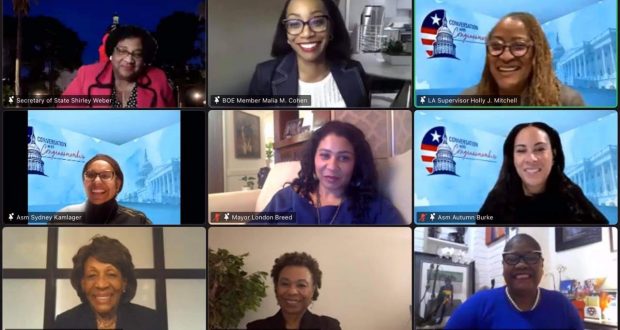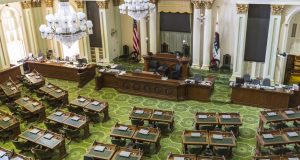By Quinci LeGardye | California Black Media
After launching a campaign last year to push for another Black woman to replace Vice President Kamala Harris in the United States Senate, a coalition of California Black women leaders say they are not defeated. They are organizing.
Many of the women – federal or state legislators, other elected officials and political leaders –have made history in California and across the nation. Now, they have come together to organize, launching an effort to ensure that more Black women are voted into elected office in California.
On February 15, the California Black Women’s Collective (CBWC) hosted “Conversation with Congresswomen Karen Bass, Barbara Lee and Maxine Waters.” Melanie Campbell, President and CEO of the National Coalition of Black Civic Participation and convener of the Black Women’s Roundtable, moderated the virtual event.
“After we were disappointed that we were not able to keep the seat for the United States Congress, we wanted to make sure that we did not lose our momentum, so we brought together this collective of Black women across California to make sure that we stay visible and active and engaged,” said LaNiece Jones, Executive Director of Peralta Colleges Foundation and Black Women Organized for Political Action (BWOPA).
According to the event’s organizers, the goal of CBWC is to amplify the priorities of Black women and organize with the goal of securing adequate representation for Black women in government. They also work in solidarity with the #WinWithBlackWomen initiative, which advocates for Black women lawmakers nationally.
The congresswomen spoke about how they ended up serving in the state legislature and later Congress, with all of them mentioning that they were ushered in by other Black legislators who called them to serve. Congresswoman Karen Bass (D-CA-37) said she entered the race for the California Assembly because other Black legislators were going to Congress and there weren’t going to be any African American women serving in the state legislature had she not run and won.
“That was very motivating to me because all of the issues that we had worked on in the community. When people leave, everything that you’ve worked on can be reversed. So, that’s what led me to run for office,” said Bass.
When asked who had been critical to their success in their career, the congresswomen spoke about Black women community leaders and local government leaders who have worked with and inspired them, including Mary Henry, Opal Jones and Lillian Mobley in South Los Angeles, Maudelle Shirek in Berkeley, Nolice Edwards and Kellie Todd Griffin in Sacramento, and Edith Austin in Oakland.
“What I liked most about them was the courage that they had. If you could’ve seen them operate, you would’ve been instilled with the kind of strength that they helped to generate for me. I’ve been out of place, outspoken, confrontational, all of that, because of all these women, and I love it, and I’m so pleased I knew them and embraced me,” said Congresswoman Maxine Waters (D-CA-43).
Speaking about their legacy, the congresswomen all say they hope they will be recognized for the fights they have led on behalf of their communities, and for delivering for their constituents. Congresswoman Barbara Lee (D-CA-13) emphasized the importance of changing systematically oppressive systems.
“Like Shirley Chisholm said, when you get inside it’s not about playing by the rules, it’s about changing those rules because they weren’t made for you and me. So, I hope that my legacy will be, I didn’t go along to get along and I tried to change the systems and structures that are creating such oppression for so many marginalized people,” said Lee.
State and local Black women legislators also spoke about the legacies they want to leave, and what they want to accomplish for both their constituents and the women who will follow in their footsteps in various roles. They also touched on the importance of creating a better future of Black Californians.
“I wanted to demonstrate to people from San Diego and for African Americans across the state, that we can actually fight this battle and win,” said California Secretary of State Shirley Weber. “That was something that was so important because so many of our communities settle for little or nothing in terms of representation. So, my goal was to basically demonstrate that we can get police reform, that we can get a reparations bill passed, that we can do things in California that others think that we couldn’t do.”
State Board of Equalization Member Malia Cohen said, “This country has done dubious things in terms of passing policies that have shaken the bedrock of our financial stability. When I think about my legacy at least, as I serve on the Board of Equalization, I really want to begin to elevate the conversation. There are very few women – let alone Black women that are in this space that are paying attention to taxes and fees and they’re paying attention to budget. That is the legacy that I hope to leave behind.”
Assemblymember Sydney Kamlager-Dove (D-Los Angeles), whose district includes Crenshaw, Ladera Heights, Baldwin Hills and Culver City, says Black politicians have to press their colleagues holding elected office to push for the changes they would like to see.
“We are at the bottom of just about every statistic when it comes to talking about Black futures, and what our Black babies are going to grow into. At the end of the day, we have got to be riding every single fellow colleague and the administration on budget decisions that are coupled with policy decisions,” said Kamlager-Dove.
Los Angeles County Board of Supervisors member Holly Mitchell emphasized that courage is required to succeed.
“I want people to be clear about my ‘why,’ and understand that I was not afraid because fear is the only thing that can stop us as Black women from being overwhelmingly successful. Don’t be afraid. If others are afraid of you that is their problem, not yours,” Mitchell said.
Assemblymember Autumn Burke spoke about her mother, Yvonne Brathwaite Burke, who also served in the state legislature. Burke said she now feels it’s her responsibility to bring Black women into the legislature as her mother did.
“Creating a bench is incredibly important to me now. It was one of my mom’s legacies. So many of her staff became speakers and supervisors and city council members. It’s something she’s really proud of. And as I look now, as I’m getting a little bit older, I’ve realized how important that really is. When I look around that room, knowing that I’m going to be the only one there, and what a disservice that is to our communities,” said Burke.
San Francisco Mayor London Breed spoke about her motivation for getting into politics, after growing up in poverty. Now, she wonders why she was one of the only people in her neighborhood to go to college and get out of poverty.
“All the people I grew up with, I now see them in the Tenderloin, sometimes strung out. I’ve gone to more funerals and I can count. The only reason why I decided to do work as a public servant is because I wanted to change things from a perspective of someone who’s was forced to live in it for most of my life. So, what I want my legacy to be is I want to look back, and I want to feel and see a difference in people’s lives,” said Breed.
 Westside Story Newspaper – Online The News of The Empire – Sharing the Quest for Excellence
Westside Story Newspaper – Online The News of The Empire – Sharing the Quest for Excellence




